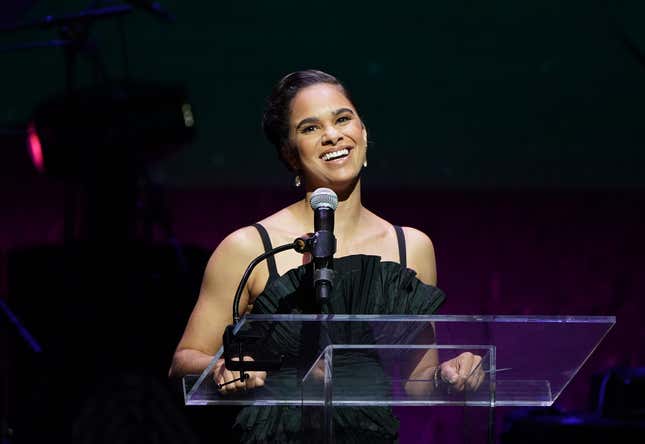
Last night, the legendary Misty Copeland accepted the awards for Arts and Activism at The Root 100 ceremony at the iconic Apollo Theater. Copeland ranked 65 on this year’s list for expanding her career to activism efforts after a brief hiatus from ballet.
The Apollo in her eyes
In her acceptance speech, she talked about the significance of The Apollo, especially as a Black dancer in a white-dominated art form, ballet:
It’s amazing to be here in Harlem, to be in this house. As someone who performs in theaters all around the world, it means so much to be in a place where we are seen and we are heard. This is our home and we see ourselves represented and reflected. I’ve performed on this stage many times. The last time I performed here was with a small, Black ballet school called the Uptown Dance Academy in the “Black Nutcracker,” I played the role of the Sugar Plum Fairy and Prince sat in that box watching,” she pointed to the left side of the theater, “that’s what this house represents.”
Her newest activism efforts
Copeland came back on the arts scene with a splash, landing a premiere of her short film “Flower” at the famed Tribeca Film Festival in 2023. “Flower” is not only a film with the guise of activism, shining light on America’s housing crisis, specifically taking place in Oakland, California but is also Copeland’s acting debut. The film was created through her female-led, Black, and Latina-operated company: Life in Motion Productions.
This year Copeland has also been vocal about inclusivity in ballet. Being the first African-American female principal dancer of the American Ballet Theatre, she understands the obstacles that other Black dancers face to participate in the art. In September, Copeland brought attention to the lack of color options for pointe shoes, and how she’s had to “pancake” or paint her shoes to match her brown skin her entire career. She acknowledges that it wasn’t until recently that some brands started to expand shades for the shoes.
Traditionally the shoes come in “European pink,” which Copeland believes to be a subconscious way for people to reinforce their lack of desire to include Black and brown people in ballet dancing. She also started a petition to urge Apple to create more shades of the pointe shoe emoji.
In her acceptance speech, she ccontinued to speak on the importance of representation in art and her own efforts to make that happen:
“I’ve always believed in the transformative power of dance and of art, the way it breaks through boundaries and forges deep connections between people. Throughout my own experiences, I’ve seen the profound impact that representation and diversity can have in the arts. It’s a privilege to use my voice, to advocate for inclusivity and equal opportunities in the world of ballet.”

